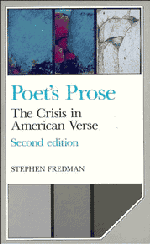Book contents
- Frontmatter
- Contents
- Preface to the second edition
- Preface to the first edition
- List of abbreviations
- Introduction: Prose and the American crisis of verse
- 1 The generative sentence: William Carlos Williams's Kora in Hell: Improvisations
- 2 “A life tracking itself”: Robert Creeley's Presences: A Test for Marisol
- 3 “He chose to include”: John Ashbery's Three Poems
- 4 The crisis at present: talk poems and the new poet's prose
- Notes
- Index
- Cambridge Studies in American Literature and Culture
4 - The crisis at present: talk poems and the new poet's prose
Published online by Cambridge University Press: 04 April 2011
- Frontmatter
- Contents
- Preface to the second edition
- Preface to the first edition
- List of abbreviations
- Introduction: Prose and the American crisis of verse
- 1 The generative sentence: William Carlos Williams's Kora in Hell: Improvisations
- 2 “A life tracking itself”: Robert Creeley's Presences: A Test for Marisol
- 3 “He chose to include”: John Ashbery's Three Poems
- 4 The crisis at present: talk poems and the new poet's prose
- Notes
- Index
- Cambridge Studies in American Literature and Culture
Summary
The poetic climate today seems to include as much criticism and philosophy as it does poetry. At present, one finds that ideas, those prime “don'ts” for imagists, radiate excitement and allure. American poets read with poetic appreciation and sometimes envy the prose of Roland Barthes and Jacques Derrida because it is so deeply aware of its engagement with language and with the process of composition yet simultaneously offers ideas and images of great force and currency. As we have seen, there is a strong tradition of poet's prose in America that makes easy and attractive the incorporation of such critically self-aware writing into American open-form poetry. Poets today who are writing a new poetry often do so alongside the writing or reading of criticism and are beginning to create a nongeneric poet's prose (or other types of nonlineated poetry) that continues but moves beyond the concerns we have explored thus far. Investigations by contemporary poets no longer concern the boundary between prose and poetry but rather the boundary between literature and factual or theoretical discourse – philosophy, criticism, linguistics, and so forth. In our reading of Kora in Hell, we noted the critical and polemical prose surrounding the improvisations; contemporary poets often integrate argumentative or analytical functions into their improvisations.
- Type
- Chapter
- Information
- Poet's ProseThe Crisis in American Verse, pp. 136 - 161Publisher: Cambridge University PressPrint publication year: 1990

